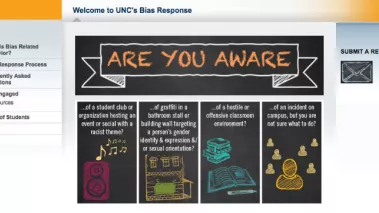Table of Contents
Facing More Troubling Details and Public Outcry, Northern Colorado Vows to Reconsider Bias Response Team

Criticism of University of Northern Colorado’s (UNC’s) Bias Response Team (BRT) is growing amid revelations the school asked professors to avoid teaching controversial subjects for fear of offending students. Now, UNC has vowed to reevaluate the BRT in light of new evidence that its investigations into “‘offensive,’ ‘triggering’ or ‘harmful’” campus speech extended outside the classroom, into students’ dorm rooms and beyond.
UNC’s Dean of Students, Katrina Rodriguez, told The Greeley Tribune that she’s transitioning away from overseeing the BRT, but she admitted there was room for improvement in the way the team addressed complaints. She said UNC officials are trying to walk “a fine line”:
“I would say that there are some aspects that we can revisit,” she said about discussions with professors. “There could have been perhaps another way to look at this.”
[...]
“We do not want to be in the process of censoring — that is not the intent,” Rodriguez said. “And there are some pieces that we can do better the next time.”
The BRT reports, originally obtained by Heat Street through Colorado’s Open Records Act and recapped here on The Torch last week, raise questions as to the impact BRTs—which exist at UNC and over 125 other public institutions—can have when addressing student speech protected by the First Amendment and faculty explorations of controversial topics in the classroom. According to The Greeley Tribune, UNC says its BRT “simply seek[s] to educate students about offensive rhetoric.”
That education apparently includes not only directing professors to steer clear of controversial subjects but also asking students to reconsider what views they espouse in their own dorm rooms. FIRE Reporter and Program Officer for the Individual Rights Defense Program Adam Steinbaugh discussed the contents of one BRT report with the The Greeley Tribune:
In August, the Bias Response Team at UNC investigated a student for displaying a Confederate flag in his dorm room. A UNC employee approached the student, and asked the student to move it so it wasn’t displayed so publicly (it was hanging in the student’s window).
Just because the student complied, doesn’t mean the student moved it voluntarily, Steinbaugh said.
“If you have someone that can write you up or subject you to a disciplinary process, that would raise substantial First Amendment concerns,” Steinbaugh said.
The controversy over UNC’s BRT underscores just how easy it is for vague policies, such as the one UNC enforced here, to be abused. According to FIRE’s Spotlight Database, which tracks speech codes on American campuses and ranks them by their propensity to restrict speech, UNC’s Bias Response policy earns a “yellow light.” That means its language impermissibly restricts at least some protected expression or, by virtue of its vague wording, could too easily be used to restrict protected expression. This is a perfect example of a policy being used for that very purpose.
By our count, more than 125 public institutions and at least 30 private institutions maintain centralized systems to report offensive speech to campus administrators. While listening to students’ concerns and providing them the ability to bring concerning situations to administrators’ attention is not necessarily problematic, how administrators respond to such reports in practice can raise substantial First Amendment concerns. Just ask the Young Americans for Liberty and College Libertarian chapters at the University of South Carolina, whose members have sued the university as part of our Stand Up For Speech Litigation Project for subjecting them to extended questioning after students filed complaints about the groups’ public display of examples of censorship on college campuses.
Recent Articles
Get the latest free speech news and analysis from FIRE.

Remembering 'free-thinking' writer Nat Hentoff
Podcast

The trouble with banning Fizz

FIRE's 2025 impact in court, on campus, and in our culture
